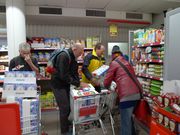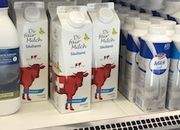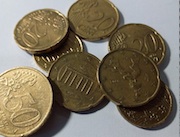EMB Newsletter December 2017
Newsletter as PDF
Contact
EMB - European Milk Board asbl
Rue de la Loi 155
B-1040 Bruxelles
Phone: +32 - 2808 - 1935
Fax: +32 - 2808 - 8265
Dear dairy farmers, dear interested parties,

December 2017 - time to take stock of the milk year 2017. A year that was marked by the EU volume reduction programme, which had an immediate effect on the dairy market.
Voluntary production cuts are something the European Milk Board has been demanding for many years and are also part of our Market Responsibility Programme (MRP). While the buying up of about 400,000 tons of milk powder as part of private and public intervention did not have any positive effect on milk prices, the introduction of voluntary production cuts led to a turnaround in the downward price spiral.
Butter was a curious exception in 2017. A change in food habits and a scientific confirmation of the nutritional value of butter led to record prices. The fact that speculation is still part of the game is leading to butter prices currently sinking again. Traders, nonetheless, assume that the demand for butter will remain high. Have the higher butter prices brought some relief to Europe's dairy farmers? Barely, because dairies have increased their prices for fat content only marginally. As a result, current milk prices continue to be lower than production costs. In the system as it stands, price increases are not passed on to producers.
The foresight shown by decision-makers leaves much to be desired. The current proposals to reform the Common Agricultural Policy are categorically detrimental to us producers: An article on voluntary production cuts has not been included in the Omnibus Regulation. In response to a question by the EMB at the Civil Dialogue Group meeting on Milk in October, we were told that Agriculture Commissioner Hogan did not wish to make volume reduction a permanent instrument and that they want to prevent milk producers from relying too heavily on this measure. We are absolutely stunned: There are no such concerns with regards to milk powder and butter intervention. Processors and traders would undertake no risk whatsoever with this instrument. On the contrary, the high volumes of impossible-to-sell milk powder in storage are currently an issue for the European Commission. Agriculture Commissioner Hogan has recently tabled an amendment regarding the intervention buying of milk powder and wishes to reduce fixed-price public intervention buying in 2018 to zero tons. However, this temporary limitation on intervention volumes is no solution to the problems plaguing milk producers because it means that all risks must now be shouldered fully by dairy farmers.
At the EMB Members' Assembly, all members agreed that the only way to ensure long-term stability on the dairy market is to anchor the Market Responsibility Programme as a crisis instrument in the CAP. Only voluntary production cuts as an instrument can give milk producers a real choice about how to react when faced with a crisis. The EMB and its members will continue with this message and their efforts in 2018 as well. Political decision-makers must accept that we are not going to give up! It is time for the Common Agricultural Policy to once again be fair to whom it was created for: the weakest link in the chain. Active milk producers must be assured that they are safe from the imbalance of agricultural policy. Dairy farmers, who work the land with their effort and commitment, are an integral part of the rural landscape. They create jobs and strengthen the European economy. However, we dairy farmers are rarely recognised for our efforts. The fact that this has consequences is plain to see in the number of our colleagues who are shutting down their farms. Policy-makers must finally understand that they are responsible for deciding what shape Europe's future development will take. Agriculture is the cornerstone of the EU and of Brussels as well.
Dear policy-makers, please do what you have been hired to do: Protect your citizens from the power and dominance of individuals. Do not let yourselves be influenced by a handful of CEOs who only care about their own interests. Let us all benefit from a common European Union.
I wish you all a Merry Christmas and a happy and healthy New Year! And I wish our policy-makers acumen and foresight as well.
Sieta van Keimpema, Vice-president of the European Milk Board
FrieslandCampina gives itself the option of a standstill
Demonstration in Bern and launch of milk petition
Successful start for Fair Milk in Switzerland
EMB milk price comparison: Nothing to celebrate for dairy farmers
Prevent future dairy crises! Ensure long-term milk production!
Dear dairy farmers, dear interested parties,

December 2017 - time to take stock of the milk year 2017. A year that was marked by the EU volume reduction programme, which had an immediate effect on the dairy market.
Voluntary production cuts are something the European Milk Board has been demanding for many years and are also part of our Market Responsibility Programme (MRP). While the buying up of about 400,000 tons of milk powder as part of private and public intervention did not have any positive effect on milk prices, the introduction of voluntary production cuts led to a turnaround in the downward price spiral.
Butter was a curious exception in 2017. A change in food habits and a scientific confirmation of the nutritional value of butter led to record prices. The fact that speculation is still part of the game is leading to butter prices currently sinking again. Traders, nonetheless, assume that the demand for butter will remain high. Have the higher butter prices brought some relief to Europe's dairy farmers? Barely, because dairies have increased their prices for fat content only marginally. As a result, current milk prices continue to be lower than production costs. In the system as it stands, price increases are not passed on to producers.
The foresight shown by decision-makers leaves much to be desired. The current proposals to reform the Common Agricultural Policy are categorically detrimental to us producers: An article on voluntary production cuts has not been included in the Omnibus Regulation. In response to a question by the EMB at the Dairy Civil Dialogue Group meeting in October, we were told that Agriculture Commissioner Hogan did not wish to make volume reduction a permanent instrument and that they want to prevent milk producers from relying too heavily on this measure. We are absolutely stunned: There are no such concerns with regards to milk powder and butter intervention. Processors and traders would undertake no risk whatsoever with this instrument. On the contrary, the high volumes of impossible-to-sell milk powder in storage are currently an issue for the European Commission. Agriculture Commissioner Hogan has recently tabled an amendment regarding the intervention buying of milk powder and wishes to reduce fixed-price public intervention buying in 2018 to zero tons. However, this temporary limitation on intervention volumes is no solution to the problems plaguing milk producers because it means that all risks must now be shouldered fully by dairy farmers.
At the EMB Members' Assembly, all members agreed that the only way to ensure long-term stability on the dairy market is to anchor the Market Responsibility Programme as a crisis instrument in the CAP. Only voluntary production cuts as an instrument can give milk producers a real choice about how to react when faced with a crisis. The EMB and its members will continue with this message and their efforts in 2018 as well. Political decision-makers must accept that we are not going to give up! It is time for the Common Agricultural Policy to once again be fair to whom it was created for: the weakest link in the chain. Active milk producers must be assured that they are safe from the imbalance of agricultural policy. Dairy farmers, who work the land with their effort and commitment, are an integral part of the rural landscape. They create jobs and strengthen the European economy. However, we dairy farmers are rarely recognised for our efforts. The fact that this has consequences is plain to see in the number of our colleagues who are shutting down their farms. Policy-makers must finally understand that they are responsible for deciding what shape Europe's future development will take. Agriculture is the cornerstone of the EU and of Brussels as well.
Dear policy-makers, please do what you have been hired to do: Protect your citizens from the power and dominance of individuals. Do not let yourselves be influenced by a handful of CEOs who only care about their own interests. Let us all benefit from a common European Union.
I wish you all a Merry Christmas and a happy and healthy New Year! And I wish our policy-makers acumen and foresight as well.
Sieta van Keimpema, Vice-president of the European Milk Board
Impressum
European Milk Board asbl
Rue de la Loi 155
B-1040 Bruxelles
Phone: +32 2808 1935
Fax: +32 2808 8265
E-Mail: office@europeanmilkboard.org
Website: http://www.europeanmilkboard.org





